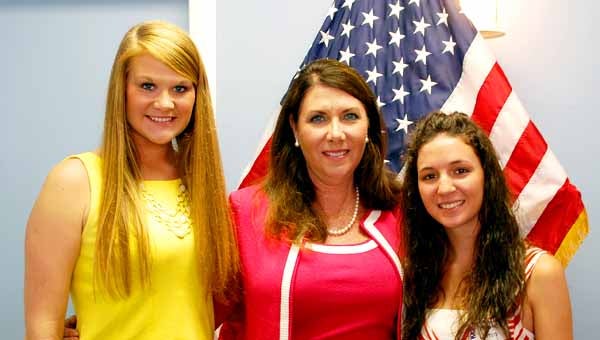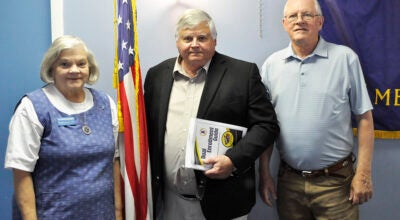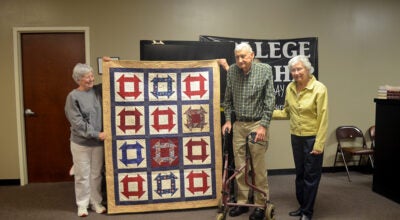Supreme Court Justice shares concerns at Republican Women’s lunch
Published 11:00 pm Wednesday, June 26, 2013

Pictured left to right, Kori Chirico, Kelli Wise, and Abigail Linton. The three were presenters at Wednesday’s PCRW luncheon.
Written by Kelsey Vickers, intern with The Messenger
Supreme Court Justice Kelli Wise spoke to the Pike County Republican Women on Wednesday about her experiences being a member of the court, as well as issues within the system.
At the beginning of the meeting, two scholarship recipients of the Republican Women’s scholarship read their winning essays for the ladies.
The scholarship recipients were Kori Chirico and Abigail Linton, whose essays covered the topic of the second amendment in the Constitution. The $1,000 scholarship is awarded to senior high school students in the Pike County area in memory of Isabelle Jean Haigh. Haigh was the mother of Thomas Haigh, who is the chairman of the Pike County Republican Party.
After the recipients read their essays, Wise was introduced and began speaking about her passion for the rights of the second amendment.
“I’ve been a lifetime member of the NRA (National Rifle Association) since I was 21,” she shared.
Wise spoke of her experiences working for the Supreme Court, speaking highly of those she has worked with.
“I’ve enjoyed working with Chuck Malone and was sad to see him defeated,” she said. “We worked very well together as a court.”
Malone is currently on the circuit court in Tuscaloosa, according to Wise.
Wise said that one of the biggest issues within the court in recent years has been funding.
“It’s changed a lot for us, and we’ve had a problem with it lately,” she said. “We’re thankful for our budget, but unfortunately we’re about $8 million short.”
Because of this, the court has been forced to have extreme layoffs within the past 10 years. Wise said that it was disheartening to have to cut costs and let people go.
“The people affected most by this are those in the circuits,” she mentioned. “They’d probably tell you that they’re down to the bare minimum now.”
Another issue Wise brought up was that of the unequal budgets among the government branches.
“The judicial budget has been cut almost 45 percent, the legislature has been cut four percent, and the executive branch has increased about 45 percent within the past 10 years,” she said. “Our situation is, we’re a co-equal branch and we want to be adequately funded.”
Wise also talked about the issue of cases within the court taking an extended period of time to go through the system.
“Justice delayed is justice denied,” she said. “Our court works very hard to get cases out in a timely manner. Our internal rule says they must be out within a year, but obviously some don’t get out in that period of time.”
She said when the court is criticized, it doesn’t mean the case has been sitting on the shelf.
“It can take a long time due to several reasons,” she said. “We put a lot of emphasis on important cases, and just because there’s a delay doesn’t mean it’s not being worked on; we want to make sure we are following the law and making the right decisions.”
Wise said that she feels incredibly lucky to be a part of the Supreme Court.
“Ever since I realized how blessed I am, I have been thankful for where I am and thankful for those who have helped put me here,” she said. “I am very conscientious of the ramifications of the decisions I make, and I hope in four years I have the opportunity again.”





